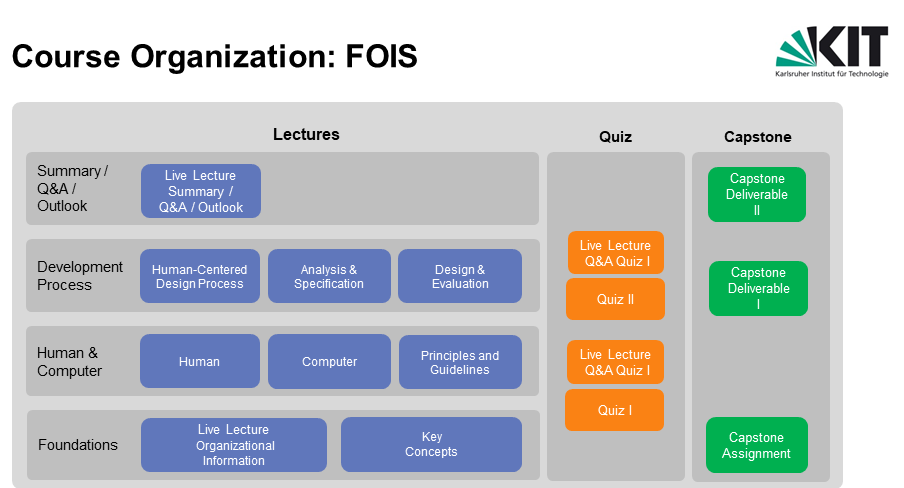Foundations of Interactive Systems
- Type: Lecture (V)
- Semester: SS 2021
-
Place:
Online
-
Time:
2021-04-13
12:00 - 13:30 weekly
10.11 Hertz-Hörsaal
10.11 Verwaltungsgebäude, Hauptbau (OG 1)
2021-04-13
12:00 - 13:30 weekly
10.21 Carl-Benz-Hörsaal
10.21 Hörsaalgebäude (OG 1)
2021-04-20
12:00 - 13:30 weekly
10.11 Hertz-Hörsaal
10.11 Verwaltungsgebäude, Hauptbau (OG 1)
2021-04-20
12:00 - 13:30 weekly
10.21 Carl-Benz-Hörsaal
10.21 Hörsaalgebäude (OG 1)
2021-04-27
12:00 - 13:30 weekly
10.21 Carl-Benz-Hörsaal
10.21 Hörsaalgebäude (OG 1)
2021-04-27
12:00 - 13:30 weekly
10.11 Hertz-Hörsaal
10.11 Verwaltungsgebäude, Hauptbau (OG 1)
2021-05-04
12:00 - 13:30 weekly
10.21 Carl-Benz-Hörsaal
10.21 Hörsaalgebäude (OG 1)
2021-05-04
12:00 - 13:30 weekly
10.11 Hertz-Hörsaal
10.11 Verwaltungsgebäude, Hauptbau (OG 1)
2021-05-11
12:00 - 13:30 weekly
10.11 Hertz-Hörsaal
10.11 Verwaltungsgebäude, Hauptbau (OG 1)
2021-05-11
12:00 - 13:30 weekly
10.21 Carl-Benz-Hörsaal
10.21 Hörsaalgebäude (OG 1)
2021-05-18
12:00 - 13:30 weekly
10.11 Hertz-Hörsaal
10.11 Verwaltungsgebäude, Hauptbau (OG 1)
2021-05-18
12:00 - 13:30 weekly
10.21 Carl-Benz-Hörsaal
10.21 Hörsaalgebäude (OG 1)
2021-06-01
12:00 - 13:30 weekly
10.11 Hertz-Hörsaal
10.11 Verwaltungsgebäude, Hauptbau (OG 1)
2021-06-01
12:00 - 13:30 weekly
10.21 Carl-Benz-Hörsaal
10.21 Hörsaalgebäude (OG 1)
2021-06-08
12:00 - 13:30 weekly
10.21 Carl-Benz-Hörsaal
10.21 Hörsaalgebäude (OG 1)
2021-06-08
12:00 - 13:30 weekly
10.11 Hertz-Hörsaal
10.11 Verwaltungsgebäude, Hauptbau (OG 1)
2021-06-15
12:00 - 13:30 weekly
10.11 Hertz-Hörsaal
10.11 Verwaltungsgebäude, Hauptbau (OG 1)
2021-06-15
12:00 - 13:30 weekly
10.21 Carl-Benz-Hörsaal
10.21 Hörsaalgebäude (OG 1)
2021-06-22
12:00 - 13:30 weekly
10.11 Hertz-Hörsaal
10.11 Verwaltungsgebäude, Hauptbau (OG 1)
2021-06-22
12:00 - 13:30 weekly
10.21 Carl-Benz-Hörsaal
10.21 Hörsaalgebäude (OG 1)
2021-06-29
12:00 - 13:30 weekly
10.21 Carl-Benz-Hörsaal
10.21 Hörsaalgebäude (OG 1)
2021-06-29
12:00 - 13:30 weekly
10.11 Hertz-Hörsaal
10.11 Verwaltungsgebäude, Hauptbau (OG 1)
2021-07-06
12:00 - 13:30 weekly
10.21 Carl-Benz-Hörsaal
10.21 Hörsaalgebäude (OG 1)
2021-07-06
12:00 - 13:30 weekly
10.11 Hertz-Hörsaal
10.11 Verwaltungsgebäude, Hauptbau (OG 1)
2021-07-13
12:00 - 13:30 weekly
10.11 Hertz-Hörsaal
10.11 Verwaltungsgebäude, Hauptbau (OG 1)
2021-07-13
12:00 - 13:30 weekly
10.21 Carl-Benz-Hörsaal
10.21 Hörsaalgebäude (OG 1)
2021-07-20
12:00 - 13:30 weekly
10.21 Carl-Benz-Hörsaal
10.21 Hörsaalgebäude (OG 1)
2021-07-20
12:00 - 13:30 weekly
10.11 Hertz-Hörsaal
10.11 Verwaltungsgebäude, Hauptbau (OG 1)
- Lecturer:
- SWS: 3
- Lv-No.: 2540560
+++ Aktuelle Situation +++
Die Vorlesung Foundations of Interactive Systems findet trotz der aktuell durch COVID-19 verursachten Einschränkungen statt. Die ersten vier Veranstaltungen (ggf. mehr folgend) werden online über ILIAS zur Verfügung gestellt. Zudem besteht die Möglichkeit fachliche und organisatorische Fragen jederzeit über das entsprechende Ilias Forum zu artikulieren.
Description
Advanced information and communication technologies make interactive systems ever-present in the users’ private and business life. They are an integral part of smartphones, devices in the smart home, mobility vehicles as well as at the working place. With the continuous growing capabilities of computers, the design of the interaction between human and computer becomes even more important. This lecture introduces foundations on design processes and principles for interactive systems. The lecture focuses on foundational concepts, theories, practices and methods for the design of interactive systems. The students get the foundational knowledge to guide the design of interactive systems in business and private life.
Learning Objectives
The aim of this course is to introduce the foundations of interactive systems. Thereby, the students:
- have a basic understanding of conceptual and theoretical foundations of interactive systems from a human and computer perspective.
- are aware of important design principles for the design of interactive systems.
- know design processes and techniques for developing interactive systems.
- know how to apply the knowledge and skills gathered in the lecture for a real-world problem (capstone project).
Prerequisites
No specific prerequisites are required for the lecture
Grading
The course has two grading components: Exam (60%) and Capstone Project (40%). First, there will be a 60 minutes closed-book / closed-notes exam consisting of short-answer, multiple-choice and analytical questions covering lecture material and business talks. Second, teams work in a capstone project and design an interactive system. Each team has to deliver a paper (max 5 pages) which presents the activities carried out in the human-centered design project and the resulting prototype (in the form of a screencam). Both grading components need to be passed (grade 4.0 or better). A fail in either the exam or the capstone project results in a fail of the entire course. There is no retake possibility for the capstone project. Thus, if you fail the capstone pro-ject, you need to retake the entire course in the upcoming year. Additionally, we will offer on a voluntarily basis the online assessment of lecture contents in the form of two quizzes as a preparation for exam. If 2/3 questions in the two quizzes are correctly answered, there is bonus for the exam (one grading step: 0,3).
Registration and Organization
Please register via the learning platform ILIAS to the course. For specific dates and location of the lecture, please check the Website or portal. All questions regarding content, organization, and certificates are answered by the responsible single point of contact for the lecture as documented on the research group Website.
Literature
Alan Dix, Janet E. Finlay, Gregory D. Abowd, and Russell Beale. 2003. Human-Computer Interaction (3rd Edition). Prentice-Hall, Inc., USA.
Helen Sharp, Yvonne Rogers, and Jenny Preece. 2017 (4th edition). Interaction Design: Beyond Human Computer Interaction. John Wiley & Sons, Inc., Hoboken, NJ, USA.
Further literature will be made available in the lecture.
Course Outline
Contact:


